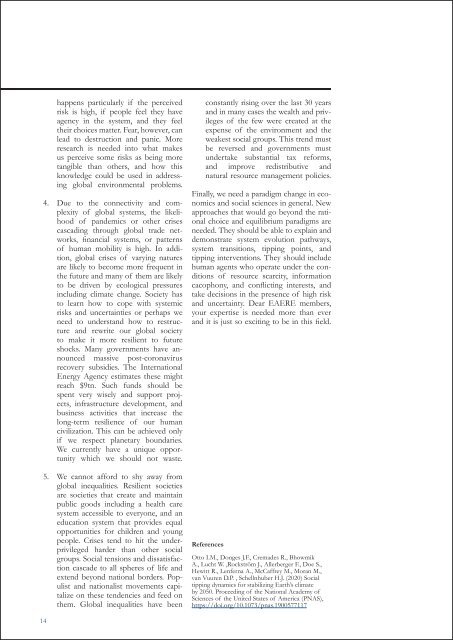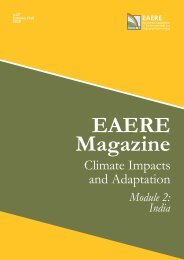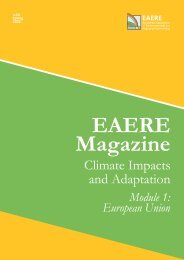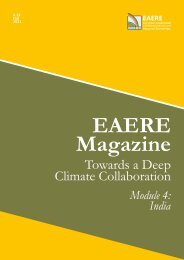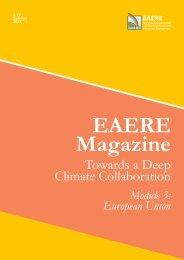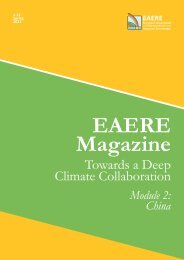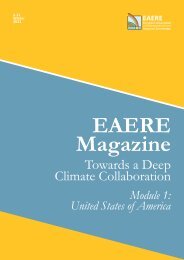Create successful ePaper yourself
Turn your PDF publications into a flip-book with our unique Google optimized e-Paper software.
happens particularly if the perceived<br />
risk is high, if people feel they have<br />
agency in the system, and they feel<br />
their choices matter. Fear, however, can<br />
lead to destruction and panic. More<br />
research is needed into what makes<br />
us perceive some risks as being more<br />
tangible than others, and how this<br />
knowledge could be used in addressing<br />
global environmental problems.<br />
4. Due to the connectivity and complexity<br />
of global systems, the likelihood<br />
of pandemics or other crises<br />
cascading through global trade networks,<br />
financial systems, or patterns<br />
of human mobility is high. In addition,<br />
global crises of varying natures<br />
are likely to become more frequent in<br />
the future and many of them are likely<br />
to be driven by ecological pressures<br />
including climate change. Society has<br />
to learn how to cope with systemic<br />
risks and uncertainties or perhaps we<br />
need to understand how to restructure<br />
and rewrite our global society<br />
to make it more resilient to future<br />
shocks. Many governments have announced<br />
massive post-coronavirus<br />
recovery subsidies. The International<br />
Energy Agency estimates these might<br />
reach $9tn. Such funds should be<br />
spent very wisely and support projects,<br />
infrastructure development, and<br />
business activities that increase the<br />
long-term resilience of our human<br />
civilization. This can be achieved only<br />
if we respect planetary boundaries.<br />
We currently have a unique opportunity<br />
which we should not waste.<br />
5. We cannot afford to shy away from<br />
global inequalities. Resilient societies<br />
are societies that create and maintain<br />
public goods including a health care<br />
system accessible to everyone, and an<br />
education system that provides equal<br />
opportunities for children and young<br />
people. Crises tend to hit the underprivileged<br />
harder than other social<br />
groups. Social tensions and dissatisfaction<br />
cascade to all spheres of life and<br />
extend beyond national borders. Populist<br />
and nationalist movements capitalize<br />
on these tendencies and feed on<br />
them. Global inequalities have been<br />
constantly rising over the last 30 years<br />
and in many cases the wealth and privileges<br />
of the few were created at the<br />
expense of the environment and the<br />
weakest social groups. This trend must<br />
be reversed and governments must<br />
undertake substantial tax reforms,<br />
and improve redistributive and<br />
natural resource management policies.<br />
Finally, we need a paradigm change in economics<br />
and social sciences in general. New<br />
approaches that would go beyond the rational<br />
choice and equilibrium paradigms are<br />
needed. They should be able to explain and<br />
demonstrate system evolution pathways,<br />
system transitions, tipping points, and<br />
tipping interventions. They should include<br />
human agents who operate under the conditions<br />
of resource scarcity, information<br />
cacophony, and conflicting interests, and<br />
take decisions in the presence of high risk<br />
and uncertainty. Dear <strong>EAERE</strong> members,<br />
your expertise is needed more than ever<br />
and it is just so exciting to be in this field.<br />
References<br />
Otto I.M., Donges J.F., Cremades R., Bhowmik<br />
A., Lucht W. ,Rockström J., Allerberger F., Doe S.,<br />
Hewitt R., Lenferna A., McCaffrey M., Moran M.,<br />
van Vuuren D.P. , Schellnhuber H.J. (<strong>2020</strong>) Social<br />
tipping dynamics for stabilizing Earth’s climate<br />
by 2050. Proceeding of the National Academy of<br />
Sciences of the United States of America (PNAS),<br />
https://doi.org/10.1073/pnas.1900577117<br />
14


